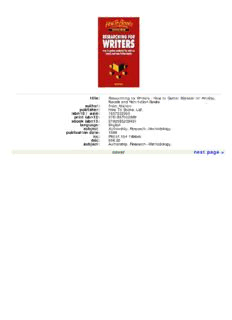
Researching for Writers: How to Gather Material for Articles, Novels and Non-fiction Books PDF
Preview Researching for Writers: How to Gather Material for Articles, Novels and Non-fiction Books
cover next page > title: Researching for Writers : How to Gather Material for Articles, Novels and Non-fiction Books author: Field, Marion. publisher: How To Books, Ltd. isbn10 | asin: 1857032365 print isbn13: 9781857032369 ebook isbn13: 9780585239491 language: English subject Authorship, Research--Methodology. publication date: 1998 lcc: PN151.F54 1998eb ddc: 808.02 subject: Authorship, Research--Methodology. cover next page > < previous page page_1 next page > Page 1 Researching for Writers < previous page page_1 next page > < previous page page_2 next page > Page 2 How To Books on Successful Writing Copyright & Law for Writer Writing a Report Creating a Twist in the Tale Writing a Textbook Creative Writing Writing an Assignment How to be a Freelance Journalist Writing an Essay How to Publish a Book Writing & Publishing Poetry How to Publish a Newsletter Writing & Selling a Novel How to Start Word Processing Writing Business Letters How to Write a Press Release Writing Erotic Fiction How to Write & Sell Computer Writing for Publication Software Writing Reviews How to Write for Television Writing Romantic Fiction Mastering Business English Writing Science Fiction, Fantasy & Horror Researching for Writers Starting to Write Writing Short Stories & Articles Writing a Nonfiction Book Writing Your Dissertation Other titles in preparation The How To Series now contains more than 200 titles in the following categories: Business & Management Personal Finance Computer Basics Self-Development General Reference Small Business Jobs & Careers Student Handbooks Living & Working Abroad Successful Writing Please send for a free copy of the latest catalogue for full details (see back cover for address). < previous page page_2 next page > < previous page page_3 next page > Page 3 Researching for Writers How to Gather Material for Articles, Novels and Non-fiction Books Marion Field How To Books < previous page page_3 next page > < previous page page_4 next page > Page 4 Cartoons by Mike Flanagan British Library Cataloguing in Publication Data A catalogue record for this book is available from the British Library. © Copyright 1998 by Marion Field First published by How To Books Ltd, 3 Newtec Place, Magdalen Road, Oxford OX4 IRE, United Kingdom. Tel: (01865) 793806. Fax: (01865) 248780. All rights reserved. No part of this work may be reproduced or stored in an information retrieval system (other than for purposes of review) without the express permission of the Publisher in writing. Note: The material contained in this book is set out in good faith for general guidance and no liability can be accepted for loss or expense incurred as a result of relying in particular circumstances on statements made in the book. The laws and regulations are complex and liable to change, and readers should check the current position with the relevant authorities before making personal arrangements. Produced for How To Books by Deer Park Productions. Typeset by PDQ Typesetting, Stoke-on-Trent, Staffs. Printed and bound by Cromwell Press, Trowbridge, Wiltshire. < previous page page_4 next page > < previous page page_5 next page > Page 5 Contents List of Illustrations 8 Preface 9 11 1 Preparing Your Topic 11 Building Up Your Research Library 13 Deciding on Your Topic 15 Breaking Down Your Topic 16 Making Your Research Statement 16 Writing Your Topic Sentence 17 Planning Your Research Outline 17 Case Studies 19 Points for Discussion 20 2 Discovering Research Techniques 20 Finding Out What is Available 20 Making Use of Libraries 23 Discovering Reference Material 26 Searching Out Original Material 28 Making Visits 29 Using Audio and Visual Material 31 Case Studies 32 Points for Discussion 33 3 Using Personal Documents 33 Making Use of Diaries and Letters 35 Using Autobiographies and Biographies 36 Discovering Private Papers 36 Paying Attention to Detail 36 Utilising Budgets, Accounts and Menus 37 Unearthing Local History 38 Case Studies 39 Points for Discussion < previous page page_5 next page > < previous page page_6 next page > Page 6 40 4 Interviewing Useful Contacts 40 Approaching Your Subject 41 Preparing for the Interview 42 Facing Your Subject 43 Concluding the Interview 44 Following the Interview 44 Case Studies 46 Points for Discussion 47 5 Preparing Questionnaires 47 Introducing Questionnaires 47 Using Questionnaires Effectively 50 Writing the Questions 51 Collating the Data 51 Making Use of the Information 51 Case Studies 54 Points for Discussion 55 6 Soaking Yourself in the Atmosphere 55 Observing Your Setting 57 Taking Photographs 58 Studying the Area 59 Case Studies 61 Points for Discussion 62 7 Reliving the Past 62 Visiting Historic Buildings 65 Studying Costume 67 Researching Social Customs 70 Getting the Flavour of the Language 72 Contacting Your Local Historical Society 72 Checking Your Facts 72 Case Studies 74 Points for Discussion 75 8 Travelling the World 75 Filing Your Material 75 Using Travel Agents 76 Contacting Tourist Offices 76 Exploring Transport 77 Studying Maps and Guidebooks 77 Collecting Souvenirs 78 Delving Into Diaries 78 Revising the Points < previous page page_6 next page > < previous page page_7 next page > Page 7 78 Case Study 78 Points for Discussion 79 9 Doing Things Your Way 79 Finding Your Level 79 Researching for Your Novel 81 Planning Your Non-Fiction Work 82 Writing Your Article 83 Working on Your Biography 83 Writing a Textbook 84 Writing for Children 85 Case Studies 86 Points for Discussion 87 10 Producing the Finished Work 87 Collating the Material 87 Writing the Piece 87 Editing the Material 88 Submitting Your Work 88 Revising the Points 88 Case Studies 93 Points for Discussion Glossary 95 Useful Reference Books 96 Useful Addresses 97 Internet Cafes[Cafés] 98 Index 99
